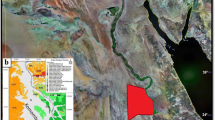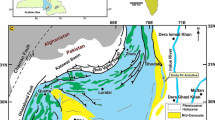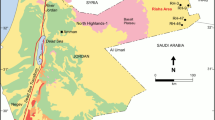Abstract
The Oligocene Zhuhai sandstones are significant reservoirs for hydrocarbons in the Baiyun Sag, South China Sea. For effective appraisal, exploration and exploitation of such a deep-water hydrocarbon sandstone, samples of five wells from depths of 850 m to 3 000 m were studied. A series of comprehensive petrographic and geochemical analyses were performed to unravel the diagenetic features and their impact on the reservoir quality. Petrographically, the sandstones are dominated by feldspathic litharenites and lithic arenites with fine to medium grain sizes and moderate to good sorting. The reservoir quality varies greatly with a range of porosity from 0.2% to 36.1% and permeability from 0.016 × 10−3 µm2 to 4 301 × 10−3 µm2, which is attributed to complex diagenetic evolution related to sedimentary facies; these include compaction, cementation of calcite, dolomite, siderite and framboidal pyrite in eogenetic stage; further compaction, feldspar dissolution, precipitation of ferrocalcite and ankerite, quartz cements, formation of kaolinite and its illitization, precipitation of albite and nodular pyrite, as well as hydrocarbon charge in mesogenetic stage. The dissolution of feldspar and illitization of kaolinite provide internal sources for the precipitation of quartz cement, while carbonate cements are derived from external sources related to interbedded mudstones and deep fluid. Compaction is the predominant factor in reducing the total porosity, followed by carbonate cementation that leads to strong heterogeneity. Feldspar dissolution and concomitant quartz and clay cementation barely changes the porosity but significantly reduces the permeability. The high-quality reservoirs can be concluded as medium-grained sandstones lying in the central parts of thick underwater distributary channel sandbodies (>2 m) with a high content of detrital quartz but low cement.
Similar content being viewed by others
References
Bjørlykke K. 2014. Relationships between depositional environments, burial history and rock properties. Some principal aspects of diagenetic process in sedimentary basins. Sedimentary Geology, 301: 1–14, doi: https://doi.org/10.1016/j.sedgeo.2013.12.002
Bjørlykke K, Jahren J. 2012. Open or closed geochemical systems during diagenesis in sedimentary basins: constraints on mass transfer during diagenesis and the prediction of porosity in sandstone and carbonate reservoirs. AAPG Bulletin, 96(12): 2193–2214, doi: https://doi.org/10.1306/04301211139
Boles J R, Franks S G. 1979. Clay diagenesis in Wilcox sandstones of Southwest Texas: implications of smectite diagenesis on sandstone cementation. Journal of Sedimentary Research, 49(1): 55–70
Coplen T B, Kendall C, Hopple J. 1983. Comparison of stable isotope reference samples. Nature, 302(5905): 236–238, doi: https://doi.org/10.1038/302236a0
Curtis C D. 1978. Possible links between sandstone diagenesis and depth-related geochemical reactions occurring in enclosing mudstones. Journal of the Geological Society, 135(1): 107–117, doi: https://doi.org/10.1144/gsjgs.135.1.0107
Day-Stirrat R J, Milliken K L, Dutton S P, et al. 2010. Open-system chemical behavior in deep Wilcox Group mudstones, Texas Gulf Coast, USA. Marine and Petroleum Geology, 27(9): 1804–1818, doi: https://doi.org/10.1016/j.marpetgeo.2010.08.006
dos Anjos S M C, De Ros L F, de Souza R S, et al. 2000. Depositional and diagenetic controls on the reservoir quality of lower cretaceous Pendencia Sandstones, Potiguar Rift basin, Brazil. AAPG Bulletin, 84(11): 1719–1742
Du Guichao, Su Long, Chen Guojun, et al. 2019. Carbonate cements and its effect on reservoir property of shallow marine sandstones of Zhuhai Formation in Panyu low-uplift, Pearl River Mouth Basin. Lithologic Reservoirs (in Chinese), 31(3): 10–19
Dutton S P. 2008. Calcite cement in Permian deep-water sandstones, Delaware Basin, west Texas: origin, distribution, and effect on reservoir properties. AAPG Bulletin, 92(6): 765–787, doi: https://doi.org/10.1306/01280807107
El-Khatri F, El-Ghali M A K, Mansurbeg H, et al. 2015. Diagenetic alterations and reservoir quality evolution of lower cretaceous fluvial sandstones: Nubian Formation, Sirt Basin, North-Central Libya. Journal of Petroleum Geology, 38(2): 217–239, doi: https://doi.org/10.1111/jpg.12607
Fayek M, Harrison T M, Grove M, et al. 2001. In situ stable isotopic evidence for protracted and complex carbonate cementation in a petroleum reservoir, north Coles levee, San Joaquin Basin, California, U. S. A. Journal of Sedimentary Research, 71(3): 444–458, doi: https://doi.org/10.1306/2DC40954-0E47-11D7-8643000102C1865D
Folk R L. 1968. Petrology of Sedimentary Rocks. Austin: Hemphill Publishing Company
Friedman I, O’Neil J R. 1977. Compilation of stable isotope fractionation factors of geochemical interest. US Geological Survey Professional Paper, 440-KK
Gier S, Worden R H, Johns W D, et al. 2008. Diagenesis and reservoir quality of Miocene sandstones in the Vienna Basin, Austria. Marine and Petroleum Geology, 25(8): 681–695, doi: https://doi.org/10.1016/j.marpetgeo.2008.06.001
Giles M R, de Boer R B. 1990. Origin and significance of redistributional secondary porosity. Marine and Petroleum Geology, 7(4): 378–397, doi: https://doi.org/10.1016/0264-8172(90)90016-A
Horita J. 2014. Oxygen and carbon isotope fractionation in the system dolomite-water-CO2 to elevated temperatures. Geochimica et Cosmochimica Acta, 129: 111–124, doi: https://doi.org/10.1016/j.gca.2013.12.027
Kassem A A, Hussein W S, Radwan A E, et al. 2021. Petrographic and diagenetic study of siliciclastic Jurassic sediments from the northeastern margin of Africa: implication for reservoir quality. Journal of Petroleum Science and Engineering, 200: 108340, doi: https://doi.org/10.1016/j.petrol.2020.108340
Kassem A A, Osman O A, Nabawy B S, et al. 2022. Microfacies analysis and reservoir discrimination of channelized carbonate platform systems: an example from the Turonian Wata Formation, Gulf of Suez, Egypt. Journal of Petroleum Science and Engineering, 212: 110272, doi: https://doi.org/10.1016/j.petrol.2022.110272
Kim S T, O’Neil J R. 1997. Equilibrium and nonequilibrium oxygen isotope effects in synthetic carbonates. Geochimica et Cosmochimica Acta, 61(16): 3461–3475, doi: https://doi.org/10.1016/S0016-7037(97)00169-5
Lei Chuan, Luo Jinglan, Pang Xiong, et al. 2018. Impact of temperature and geothermal gradient on sandstone reservoir quality: the Baiyun Sag in the Pearl River Mouth Basin study case (northern South China Sea). Minerals, 8(10): 452, doi: https://doi.org/10.3390/min8100452
Li Chi, Luo Jinglan, Fan Caiwei, et al. 2021. Impact of high thermal setting and fluid activities on sandstone compaction: a case study of the Baiyun Sag in the Pearl River mouth basin (Northern South China Sea). Geofluids, 2021: 6658729
Li Youchuan, Mi Lijun, Zhang Gongcheng, et al. 2011. The formation and distribution of source rocks for deep water area in the northern of South China Sea. Acta Sedimentologica Sinica (in Chinese), 29(5): 970–979
Liao Jihua, Wu Keqiang, Er Chuang. 2022. Deep reservoir characteristics and effective reservoir control factors in Baiyun Sag of Pearl River Mouth Basin. Earth Science (in Chinese), 47(7): 2454–2467
Lundegard P D. 1992. Sandstone porosity loss — a “big picture” view of the importance of compaction. Journal of Sedimentary Research, 62(2): 250–260, doi: https://doi.org/10.1306/D42678D4-2B26-11D7-8648000102C1865D
Mangi H N, Chi Ruan, Yan Detian, et al. 2022. The ungrind and grinded effects on the pore geometry and adsorption mechanism of the coal particles. Journal of Natural Gas Science and Engineering, 100: 104463, doi: https://doi.org/10.1016/j.jngse.2022.104463
Mansurbeg H, Morad S, Salem A, et al. 2008. Diagenesis and reservoir quality evolution of palaeocene deep-water, marine sandstones, the Shetland-Faroes Basin, British continental shelf. Marine and Petroleum Geology, 25(6): 514–543, doi: https://doi.org/10.1016/j.marpetgeo.2007.07.012
Mi Lijun, He Min, Zhai Puqiang, et al. 2019. Integrated study on hydrocarbon types and accumulation periods of Baiyun sag, deep water area of Pearl River Mouth basin under the high heat flow background. China Offshore Oil and Gas (in Chinese), 31(1): 1–12
Mi Lijun, Liu Baojun, He Min, et al. 2016. Petroleum geology characteristics and exploration direction in Baiyun deep water area, northern continental margin of the South China Sea. China Offshore Oil and Gas (in Chinese), 28(2): 10–22
Moore D M, Reynolds R C Jr. 1997. X-Ray Diffraction and the Identification and Analysis of Clay Minerals. 2nd ed. Oxford: Oxford University Press, 378
Morad S, Al-Aasm I S, Ramseyer K, et al. 1990. Diagenesis of carbonate cements in Permo-Triassic sandstones from the Iberian Range, Spain: evidence from chemical composition and stable isotopes. Sedimentary Geology, 67(3–4): 281–295, doi: https://doi.org/10.1016/0037-0738(90)90039-V
Morley C K. 2016. Major unconformities/termination of extension events and associated surfaces in the South China Seas: review and implications for tectonic development. Journal of Asian Earth Sciences, 120: 62–86, doi: https://doi.org/10.1016/j.jseaes.2016.01.013
Muther T, Qureshi H A, Syed F I, et al. 2022. Unconventional hydrocarbon resources: geological statistics, petrophysical characterization, and field development strategies. Journal of Petroleum Exploration and Production Technology, 12(6): 1463–1488, doi: https://doi.org/10.1007/s13202-021-01404-x
Nadeau P H, Hurst A. 1991. Application of back-scattered electron microscopy to the quantification of clay mineral microporosity in sandstones. Journal of Sedimentary Research, 61(6): 921–925
Pang Xiong, Chen Changmin, Peng Dajun, et al. 2008. Basic geology of Baiyun deep-water area in the northern South China Sea. China Offshore Oil and Gas (in Chinese), 20(4): 215–222
Pang Xiongqi, Jia Chengzao, Wang Wenyang. 2015. Petroleum geology features and research developments of hydrocarbon accumulation in deep petroliferous basins. Petroleum Science, 12(1): 1–53, doi: https://doi.org/10.1007/s12182-015-0014-0
Rozanski K, Araguás-Araguás L, Gonfiantini R. 1993. Isotopic patterns in modern global precipitation. In: Swart P K, Lohmann K C, Mckenzie J, et al, eds. Climate Change in Continental Isotopic Records. Washington: American Geophysical Union, 1–36
Schmidt M, Xeflide S, Botz R, et al. 2005. Oxygen isotope fractionation during synthesis of CaMg-carbonate and implications for sedimentary dolomite formation. Geochimica et Cosmochimica Acta, 69(19): 4665–4674, doi: https://doi.org/10.1016/j.gca.2005.06.025
Shehata A A, Kassem A A, Brooks H L, et al. 2021. Facies analysis and sequence-stratigraphic control on reservoir architecture: example from mixed carbonate/siliciclastic sediments of Raha Formation, Gulf of Suez, Egypt. Marine and Petroleum Geology, 131: 105160, doi: https://doi.org/10.1016/j.marpetgeo.2021.105160
Stroker T M, Harris N B, Crawford Elliott W, et al. 2013. Diagenesis of a tight gas sand reservoir: upper Cretaceous Mesaverde Group, Piceance Basin, Colorado. Marine and Petroleum Geology, 40: 48–68, doi: https://doi.org/10.1016/j.marpetgeo.2012.08.003
Surdam Ronald C, Crossey L J, Hagen E S, et al. 1989. Organic-inorganic interactions and sandstone diagenesis. AAPG Bulletin, 73(1): 1–23
Taylor T R, Giles M R, Hathon L A, et al. 2010. Sandstone diagenesis and reservoir quality prediction: models, myths, and reality. AAPG Bulletin, 94(8): 1093–1132, doi: https://doi.org/10.1306/04211009123
Thyne G. 2001. A model for diagenetic mass transfer between adjacent sandstone and shale. Marine and Petroleum Geology, 18(6): 743–755, doi: https://doi.org/10.1016/S0264-8172(01)00025-3
Tian Bing, Zheng Youwei, Zhao Junmei. 2022. Sedimentary facies and evolution of Oligocene Zhuhai Formation in Baiyun Sag, South China Sea. Fault-Block Oil & Gas Field (in Chinese), 29(6): 800–806, 836
Walderhaug O. 2000. Modeling quartz cementation and porosity in Middle Jurassic Brent Group sandstones of the Kvitebjørn field, northern North Sea. AAPG Bulletin, 84(9): 1325–1339
Wang Jian, Cao Yingchang, Liu Keyu, et al. 2016. Pore fluid evolution, distribution and water-rock interactions of carbonate cements in red-bed sandstone reservoirs in the Dongying Depression, China. Marine and Petroleum Geology, 72: 279–294, doi: https://doi.org/10.1016/j.marpetgeo.2016.02.018
Wang Qi, Hao Lewei, Chen Gongcheng, et al. 2010. Forming mechanism of carbonate cements in siliciclastic sandstone of Zhuhai Formation in Baiyun Sag. Acta Petrolei Sinica (in Chinese), 31(4): 553–558, 565
Wang Daifu, Luo Jinglan, Chen Shuhui, et al. 2017. Carbonate cementation and origin analysis of deep sandstone reservoirs in the Baiyun sag, Pearl River Mouth Basin. Acta Geologica Sinica (in Chinese), 91(9): 2079–2090
Wen Jing, Zhao Jingzhou, Li Jun, et al. 2022. Characteristics of mid-deep paleogene sandstone reservoirs in Baiyun Sag and controlling effect of dissolution on high-quality reservoirs. Special Oil & Gas Reservoirs (in Chinese), 29(6): 47–55
Whiticar M J, Faber E, Schoell M. 1986. Biogenic methane formation in marine and freshwater environments: CO2 reduction vs. acetate fermentation-Isotope evidence. Geochimica et Cosmochimica Acta, 50(5): 693–709, doi: https://doi.org/10.1016/0016-7037(86)90346-7
Woo K S, Khim B K. 2006. Stable oxygen and carbon isotopes of carbonate concretions of the Miocene Yeonil Group in the Pohang Basin, Korea: types of concretions and formation condition. Sedimentary Geology, 183(1–2): 15–30, doi: https://doi.org/10.1016/j.sedgeo.2005.09.005
Worden R H, Morad S. 2000. Quartz cementation in oil field sandstones: a review of the key controversies. In: Worden R H, Morad S, eds. Quartz Cementation in Sandstones. Wiley-Black-well: International Association of Sedimentologists, 1–20
Xie Xiaojun, Xiong Lianqiao, Bai Haiqiang, et al. 2022. Characteristics of favorable reservoir and its distribution prediction in middle-deep layers in Baiyun Sag, Pearl River Mouth Basin. Earth Science (in Chinese), 47(5): 1635–1651
Yuan Guanghui, Gluyas J, Cao Yingchang, et al. 2015. Diagenesis and reservoir quality evolution of the Eocene sandstones in the northern Dongying Sag, Bohai Bay Basin, East China. Marine and Petroleum Geology, 62: 77–89, doi: https://doi.org/10.1016/j.marpetgeo.2015.01.006
Zhou Wei, Gao Xianzhi, Wang Yingmin, et al. 2015. Seismic geomorphology and lithology of the early Miocene Pearl River Deepwater Fan System in the Pearl River Mouth Basin, northern South China Sea. Marine and Petroleum Geology, 68: 449–469, doi: https://doi.org/10.1016/j.marpetgeo.2015.09.006
Zhu Weilin, Huang Baojia, Mi Lijun, et al. 2009. Geochemistry, origin, and deep-water exploration potential of natural gases in the Pearl River Mouth and Qiongdongnan basins, South China Sea. AAPG Bulletin, 93(6): 741–761, doi: https://doi.org/10.1306/02170908099
Zhu Junzhang, Shi Hesheng, He Min, et al. 2008. Origins and geochemical characteristics of gases in LW3-1-1 well in the deep sea region of Baiyun Sag, Pearl River Mouth Basin. Natural Gas Geoscience (in Chinese), 19(2): 229–233
Author information
Authors and Affiliations
Corresponding author
Additional information
Foundation item: The National Natural Science Foundation of China under contract No. 42262020; the Research Program of Science and Technology at Universities of Inner Mongolia Autonomous Region under contract No. NJZY22445.
Rights and permissions
About this article
Cite this article
Tian, B., Zuo, S., Zheng, Y. et al. Diagenetic evolution and reservoir quality of the Oligocene sandstones in the Baiyun Sag, Pearl River Mouth Basin, South China Sea. Acta Oceanol. Sin. 43, 67–82 (2024). https://doi.org/10.1007/s13131-023-2262-y
Received:
Accepted:
Published:
Issue Date:
DOI: https://doi.org/10.1007/s13131-023-2262-y




